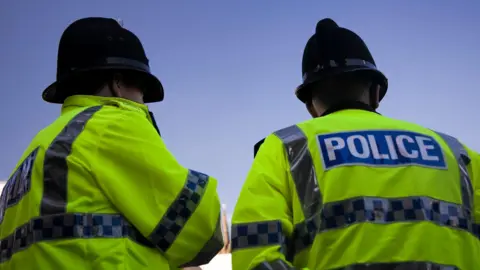Police criticised for fatal drink-driver response
 Getty Images
Getty ImagesA police force has been criticised by a coroner after they received reports about a drink-driver six hours before he drove the wrong way down the A55 in Flintshire, and hit another car head-on.
Carl Anthony Butler was more than four times over the legal drink-drive limit when, on 26 February 2022, his car collided with a vehicle being driven by 50-year-old Sean Brett, from Menai Bridge, Anglesey, killing both men.
An inquest in Ruthin, Denbighshire, heard that calls had been made to Cheshire Constabulary after motorists had to swerve to avoid Mr Butler's car as he drove erratically on major roads in the Chester area, but there was no response.
Cheshire Constabulary accepted failings, but said improvements had been made to its response systems.
John Gittins, senior coroner for north Wales east and central, issued a Prevention of Future Deaths report to Cheshire Constabulary because of what he said was a "confused picture of the management of the reports and information" and "confusion within the control room".
The inquest heard that the first 999 call was made at about 5:30am by a man working at a fuel station in Chester, who told the police that Mr Butler appeared to be drunk or "on something", as he looked jittery and had trouble finding his wallet.
Other calls were later made about Mr Butler's Audi TT swerving between lanes on the A548.
But the hearing was told the calls were not logged by police call handlers as emergency or priority level because the exact location each time was not known, and when the information was relayed to officers no-one responded.
The Independent Office for Police Conduct carried out an investigation into Cheshire Constabulary's handling of the case, and Ch Insp Daniel Reynolds, of the force, said it was accepted that there had been failings.
But he added that improvements had been made to call-handling training and response co-ordination.
Mr Gittins, who recorded narrative conclusions in the cases of both men, said he was concerned about an apparent acceptance that no-one had responded to the call to look out for Mr Butler's car.
He added that he was also concerned staff might not be receiving the training introduced since the tragedy.
Toxicology tests showed that Mr Butler had 370 micrograms of alcohol per 100 millilitres of blood - more than four times over the legal limit.
Mr Brett, a father-of-two, had been driving to Chester with his wife Nicola to celebrate her birthday at the time of the crash.
